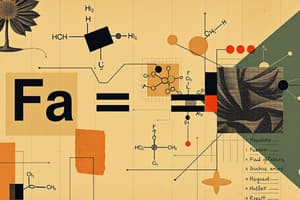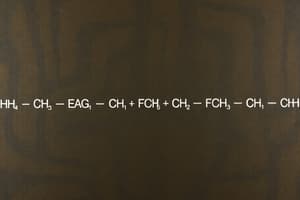Podcast
Questions and Answers
What is the smallest particle of an element?
What is the smallest particle of an element?
- Electron (correct)
- Molecule
- Neutron
- Proton
According to John Dalton, what are identical in mass and chemical properties?
According to John Dalton, what are identical in mass and chemical properties?
- Atoms of a given element (correct)
- Molecules
- Protons
- Neutrons
What is the electrical charge of a proton?
What is the electrical charge of a proton?
- Negative
- Positive (correct)
- Varies
- Neutral
What is the mass number of an atom composed of 6 protons and 7 neutrons?
What is the mass number of an atom composed of 6 protons and 7 neutrons?
What term defines atoms with the same atomic number but different mass numbers?
What term defines atoms with the same atomic number but different mass numbers?
Which substance is an example of having monatomic molecules?
Which substance is an example of having monatomic molecules?
What are atoms and molecules possessing an electric charge called?
What are atoms and molecules possessing an electric charge called?
Which of the following is a characteristic of nonelectrolytes?
Which of the following is a characteristic of nonelectrolytes?
How are formulas of substances represented?
How are formulas of substances represented?
What does the superscript in a formula for a polyatomic ion represent?
What does the superscript in a formula for a polyatomic ion represent?
In naming a compound, what is the ending changed to when naming the nonmetal part?
In naming a compound, what is the ending changed to when naming the nonmetal part?
What does Molarity (M) measure?
What does Molarity (M) measure?
What is Normality (N) a measure of?
What is Normality (N) a measure of?
How is weight percent commonly expressed?
How is weight percent commonly expressed?
What is used to express the composition of dilute aqueous solutions?
What is used to express the composition of dilute aqueous solutions?
What is the normality of a solution if 20 ml of 10 N HCl are diluted to form one liter of the solution?
What is the normality of a solution if 20 ml of 10 N HCl are diluted to form one liter of the solution?
A chemical formula is not just a shorthand notation for the name of a substance.
A chemical formula is not just a shorthand notation for the name of a substance.
According to John Dalton, all atoms of a given element are identical in mass and chemical properties.
According to John Dalton, all atoms of a given element are identical in mass and chemical properties.
Molecules always consist of monatomic atoms.
Molecules always consist of monatomic atoms.
The mass of an electron is about 1/2000 that of a proton.
The mass of an electron is about 1/2000 that of a proton.
Isotopes have the same atomic number but different mass numbers.
Isotopes have the same atomic number but different mass numbers.
Ar gas consists of diatomic molecules.
Ar gas consists of diatomic molecules.
Ions are molecules that do not possess an electric charge.
Ions are molecules that do not possess an electric charge.
Nonelectrolytes can conduct electricity even when melted.
Nonelectrolytes can conduct electricity even when melted.
Formulas of substances include the symbols of elements with numerical subscripts to denote the number of atoms in the substance.
Formulas of substances include the symbols of elements with numerical subscripts to denote the number of atoms in the substance.
Polyatomic ions do not have a superscript that denotes the charge on the ion.
Polyatomic ions do not have a superscript that denotes the charge on the ion.
In the name of a compound, the nonmetal part's ending is changed to 'ide'.
In the name of a compound, the nonmetal part's ending is changed to 'ide'.
Molarity measures the number of moles of solute in 1 liter of solvent.
Molarity measures the number of moles of solute in 1 liter of solvent.
Normality is a measure of equivalents of solute in 1 L of solution.
Normality is a measure of equivalents of solute in 1 L of solution.
Weight percent is often used to express the concentration of solid reagents.
Weight percent is often used to express the concentration of solid reagents.
Volume percent is typically used to specify the concentration of pure liquid compounds.
Volume percent is typically used to specify the concentration of pure liquid compounds.
Parts per million (ppm) is commonly used for highly concentrated solutions.
Parts per million (ppm) is commonly used for highly concentrated solutions.
Flashcards are hidden until you start studying




